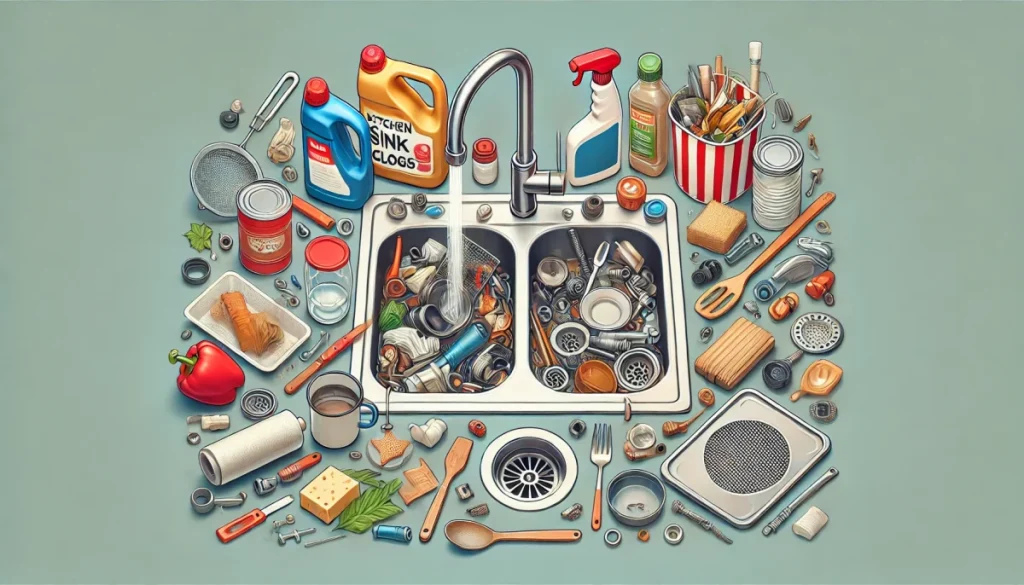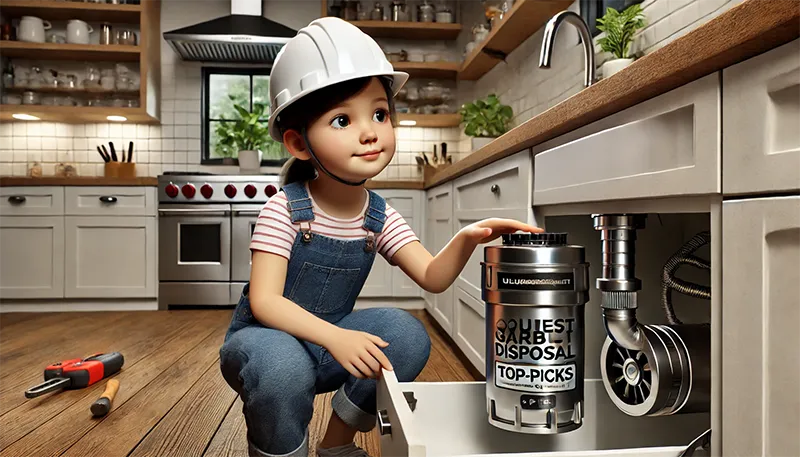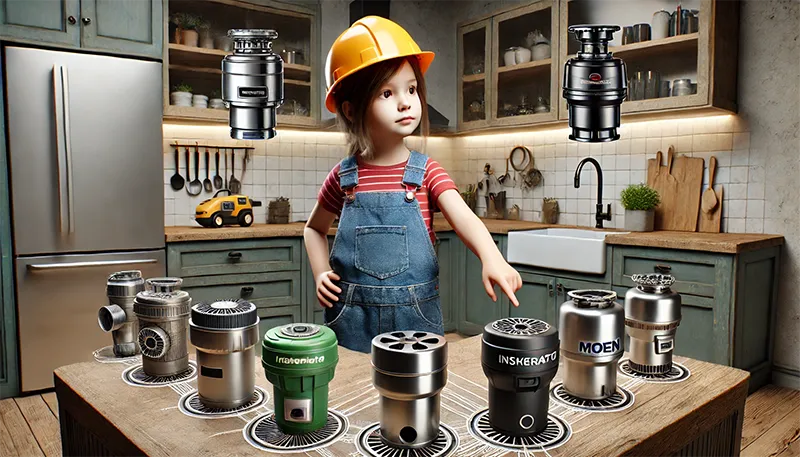Clogged kitchen sinks are not just inconvenient—they can cause a host of other problems, from unpleasant odors to costly plumbing repairs. Whether it’s due to food scraps, grease buildup, or the wrong materials going down the drain, clogs are one of the most common issues homeowners face. Prevent kitchen sink clogs is much easier than dealing with the aftermath of one. With a few simple habits and some regular maintenance, you can keep your kitchen sink running smoothly and avoid the frustration of a clogged drain.
In this guide, we’ll go over the most common causes of kitchen sink clogs, share best practices for preventing them, and provide natural solutions to keep your pipes clear. These tips will help you not only prevent clogs but also maintain the health of your plumbing system in the long term.
Common Causes of Kitchen Sink Clogs
Clogs in your kitchen sink can be caused by a variety of factors, but the main culprits are food particles, grease, and soap scum. Over time, these materials build up in your pipes, creating blockages that slow down water flow and eventually lead to a complete clog.
Grease and Oil
One of the biggest causes of clogs is cooking grease. When you pour hot grease down the drain, it may seem like it’s going to flow right through the pipes. However, as the grease cools, it solidifies, coating the inside of your pipes and creating a sticky trap for food particles and other debris. Over time, this buildup narrows the diameter of the pipe, restricting water flow and eventually leading to a blockage.
Food Scraps
Even though you may have a garbage disposal, not all food scraps should go down the drain. Items like pasta, rice, and bread can expand when they come into contact with water, causing blockages. Fibrous vegetables, such as celery and potato peels, can wrap around the blades of your disposal and cause jams. Coffee grounds are another common offender, as they tend to clump together in pipes and create clogs over time.
Soap Scum and Detergent
While it may not seem like a big deal, the soap you use can contribute to clogs. Soap scum forms when the soap combines with minerals in the water, creating a residue that sticks to the inside of pipes. Over time, this residue can build up and contribute to slow drainage. If you use dishwashing detergent, the suds can mix with food particles and grease, creating a sticky mess that leads to clogs.
Fun Fact: Did you know that grease is responsible for 47% of all sewer overflows in the U.S.? Pouring grease down the drain doesn’t just cause clogs in your home; it can lead to major blockages in public sewer systems too! (Source: EPA – Fats, Oils, and Grease)
Best Practices to Prevent Kitchen Sink Clogs
Preventing clogs isn’t difficult, but it does require consistent attention to what goes down your drain and some routine maintenance. Here are a few simple practices you can implement to keep your kitchen sink clog-free.
1. Use a Sink Strainer
A sink strainer is a small, inexpensive tool that can save you from major plumbing headaches. It’s designed to catch food particles before they go down the drain, making it one of the simplest ways to prevent clogs. Place a strainer over the drain, and be sure to clean it out after every use. This is especially important if you don’t have a garbage disposal, as food scraps will accumulate quickly in your pipes without one.
2. Proper Disposal of Grease
As mentioned earlier, grease is a major cause of clogs. Instead of pouring it down the drain, let it cool and solidify, then scrape it into the trash. If you have a lot of liquid grease (like from frying), pour it into a disposable container and throw it away once it’s solid. Even if you use hot water to flush it down the drain, grease can cool and solidify further down the pipes, leading to clogs in your home or the local sewer system.
3. Rinse with Cold Water When Using the Garbage Disposal
When running your garbage disposal, always use cold water instead of hot. Cold water helps solidify any fats or grease, allowing them to be chopped up and flushed away by the disposal, rather than melting and coating your pipes. Run the cold water for a few seconds before and after using the disposal to ensure everything is flushed out properly.
4. Regular Drain Cleaning
Cleaning your drain on a regular basis can help prevent the buildup of grease, food particles, and soap scum. A simple way to clean your drain is by pouring boiling water down it once a week. This helps melt away any small amounts of grease or food that may be clinging to the inside of your pipes. You can also use a mixture of baking soda and vinegar to clean the drain and keep it smelling fresh. Simply pour half a cup of baking soda down the drain, followed by half a cup of vinegar. Let the mixture sit for 15-20 minutes before flushing it with hot water.
Foods and Materials to Avoid Putting Down Your Sink
While it may be tempting to wash certain items down the sink, there are some foods and materials that should never go down the drain, even if you have a garbage disposal. Here’s what to avoid:
1. Grease and Oils
As mentioned earlier, grease is a major clog culprit. Bacon grease, cooking oil, and other fats should always be disposed of in the trash, not down the drain.
2. Fibrous Vegetables
Vegetables like celery, asparagus, and artichokes can cause serious problems in your drain. These fibrous foods can wrap around the blades of your garbage disposal or build up in your pipes, leading to clogs.
3. Coffee Grounds
Despite their small size, coffee grounds can pack a punch when it comes to clogging drains. They don’t break down easily in water and tend to accumulate in pipes, where they combine with grease and other debris to form clogs. Instead of washing them down the sink, toss coffee grounds in the trash or compost them if possible.
4. Eggshells and Pasta
Eggshells are often mistakenly thought to be harmless in a garbage disposal, but they can cause problems over time. The membrane inside the shell can wrap around the blades of your disposal, while the small, gritty shell fragments can settle in your pipes. Pasta, rice, and other starchy foods are also a no-go for your sink. When exposed to water, these foods expand, creating a sticky mess that clogs your pipes.
5. Fruit Pits and Bones
While some garbage disposals are built to handle tougher items, it’s best to avoid putting large, hard materials like fruit pits and bones down the drain. These items can damage your disposal’s blades and lead to jams or breakages. Always throw these materials in the trash instead.
By keeping these clog-causing materials out of your sink, you’ll significantly reduce the chances of blockages and keep your plumbing system running smoothly.
Natural Solutions to Keep Your Sink Drain Clear
When it comes to maintaining your kitchen sink, there’s no need to rely on harsh chemical drain cleaners that can damage your pipes over time. Instead, try these natural, eco-friendly solutions to keep your drain clear and odor-free.
1. Boiling Water
A simple but effective solution, pouring boiling water down the drain once a week can help prevent clogs caused by grease and food particles. Boiling water helps melt away small amounts of grease that may have built up inside the pipes, flushing it away before it has a chance to solidify and cause a blockage. Be careful when pouring the water to avoid splashes.
2. Baking Soda and Vinegar
This classic combination works wonders for cleaning drains. Start by pouring half a cup of baking soda down the drain, followed by half a cup of vinegar. The chemical reaction between the two ingredients will help break down any buildup in your pipes. Let the mixture sit for 15-20 minutes, then flush it with hot water. This method not only helps clear minor clogs but also deodorizes the drain, leaving your sink smelling fresh.
3. Lemon Peels in the Garbage Disposal
If your garbage disposal is starting to smell, lemon peels are a natural and refreshing way to clean it. Cut a lemon into small pieces and drop the peels into the disposal, then run it with cold water. The lemon’s natural oils will help break down grease and food particles while leaving your kitchen with a pleasant citrus scent.
4. Salt and Baking Soda
For a tougher cleaning solution, try using a mixture of salt and baking soda. Pour half a cup of salt and half a cup of baking soda down the drain, let it sit for a few hours (or overnight), and then flush with boiling water. The abrasive nature of the salt helps scrub away grease and debris while the baking soda neutralizes odors.
These natural methods are not only effective but also safer for your pipes compared to harsh chemical cleaners. Regularly using these techniques will help keep your drain clear and free of blockages.
When to Call a Professional
While many kitchen sink clogs can be handled with DIY solutions, there are times when it’s best to call a professional plumber. If you’re dealing with a recurring clog that keeps coming back despite your best efforts, or if you notice signs of a deeper plumbing issue, it’s time to bring in an expert.
Signs It’s Time to Call a Plumber
- Standing Water: If your sink refuses to drain at all and there’s standing water, this could indicate a severe clog deep within your plumbing system.
- Foul Odors: Persistent bad smells that don’t go away even after cleaning the sink and garbage disposal could be a sign of a serious blockage or buildup of bacteria in the pipes.
- Multiple Clogged Drains: If you have more than one drain in your home clogging at the same time, it could point to a bigger issue with your main sewer line.
- Gurgling Sounds: If you hear gurgling noises coming from your drains after running water, this could be a sign of a blockage in your vent pipes or plumbing system.
In these situations, professional drain cleaning or even sewer line inspection might be necessary to resolve the issue. A plumber can use specialized tools, such as a plumbing auger or hydro-jet, to clear out blockages that are beyond the reach of standard DIY methods.
Professional Maintenance
In addition to addressing serious clogs, professional plumbers can also provide routine maintenance to keep your kitchen sink and plumbing system in good shape. Having a plumber inspect your pipes once a year can help catch any potential issues early on, saving you from costly repairs down the road.
FAQs
-
How often should I clean my kitchen sink drain to prevent clogs?
It’s a good idea to clean your kitchen sink drain once a week to prevent clogs. Regularly flushing the drain with boiling water or using natural cleaners like baking soda and vinegar will help break down any small buildups of grease, soap, and food particles before they have a chance to form a clog.
-
Is it safe to pour grease down the sink if I use hot water?
No, pouring grease down the sink, even with hot water, is not a safe practice. While the hot water may temporarily melt the grease, it will eventually cool and solidify further down the pipes, leading to blockages. Always let grease cool and solidify, then dispose of it in the trash or a disposable container.
-
What’s the best way to dispose of food waste?
The best way to dispose of food waste is to use a sink strainer to catch food particles before they go down the drain. Empty the strainer into the trash or compost bin. Avoid putting fibrous vegetables, pasta, and coffee grounds down the garbage disposal, as these items can cause clogs.
-
Can I use chemical drain cleaners to prevent clogs?
While chemical drain cleaners may be effective at clearing clogs, they can damage your pipes over time, especially if used frequently. It’s better to rely on natural solutions like baking soda and vinegar, which are safer for your plumbing and the environment.
-
Why does my sink keep clogging even though I’m careful?
If your sink keeps clogging despite careful maintenance, it could indicate a deeper problem in your plumbing system, such as a partial blockage in your sewer line or venting issues. Persistent clogs should be evaluated by a professional plumber to prevent further damage.
Conclusion
Clogged kitchen sinks are a hassle, but with the right habits and regular maintenance, you can keep your drains clear and avoid major plumbing problems. By using a sink strainer, properly disposing of grease, and regularly cleaning your drain with natural solutions, you can prevent most clogs before they start. Remember, if you encounter a clog that you can’t fix on your own, it’s always best to call a professional plumber for assistance.
By following these simple tips, you’ll ensure that your kitchen sink remains clog-free, making daily tasks like cooking and cleaning much easier and stress-free.



